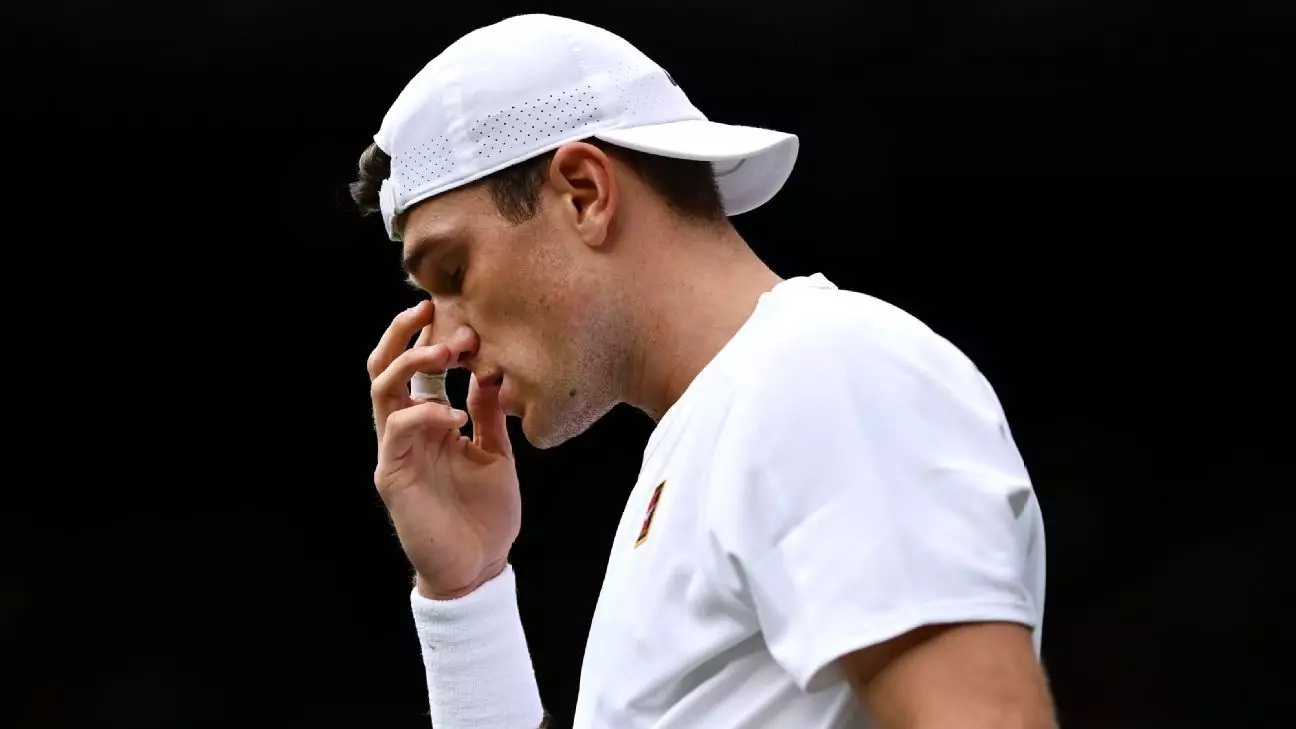Wimbledon, a tournament steeped in tradition and unpredictability, has once again defied expectations, showcasing the relentless volatility that makes tennis so captivating. This year, the landscape shifted dramatically with the defeat of a promising British talent, Jack Draper, whose journey at the All England Club ended prematurely in a display of resilience by Croatian veteran Marin Cilic. The narrative underscores a crucial truth: raw potential alone is insufficient; mental fortitude and experience often determine the outcome against formidable opposition on the sport’s biggest stage.
Draper, renowned for his aggressive groundstrokes and fiery spirit, entered the second round with hope and the weight of national expectations. Unfortunately, his campaign was cut short by a player whose career had seemed to be on the wane prior to this match. Cilic, returning to Wimbledon after stumbling through injuries, proved that resilience and skill can prevail over youthful exuberance. His straight-set victory encapsulates a broader discourse about longevity, perseverance, and the unpredictable nature of grass-court tennis. Draper’s frustrations highlight an ominous trend in tennis: the challenge of translating potential into consistent success under the intense pressure of a Grand Slam.
Cilic’s Resurgence and the Significance of Experience
Cilic’s victory was more than just a win; it was a testament to perseverance. Having endured two major knee surgeries in recent years, few would have envisioned him returning to a Grand Slam stage at a competitive level. Yet, his performance on Court One was a stark reminder that age and recent setbacks do not always equate to decline. His serve, famously potent and accurate, was on full display, peppered with 16 aces—a clear demonstration of his enduring power. His groundstrokes, consistent and aggressive, kept Draper on the back foot from start to finish.
What’s most inspiring about Cilic’s performance is the emotional richness he conveyed post-match. His words revealed a man who recognized the long, arduous road he’s traveled—a journey marked by setbacks but driven by unwavering belief. His comeback story is as compelling as his game on grass. It challenges the prevailing notion that youth is the sole guardian of success, suggesting instead that seasoned resilience and tactical mastery hold substantial weight. His victory serves as an inspiring reminder that experience, combined with relentless dedication, can reignite a career even after significant setbacks.
The Fading Hopes and the Spirit of British Tennis
For British fans, Draper’s exit was a poignant blow to the hope of a homegrown Cinderella story. A potential line-up of five British men reaching the third round would have been a historic milestone, especially considering the country’s rich tennis heritage. The early losses of Evans, Fery, and Pinnington Jones dashed those hopes quickly, leaving Draper as the last hope for a national breakthrough.
The crowd’s energy on Court One was palpable, rallying behind Draper in moments of need. His resilience in fighting back from 0-40 down and saving crucial break points exemplified the fighting spirit that has endeared him to tennis fans. Yet, tactical lapses and the relentless consistency of Cilic ultimately extinguished those dreams. Draper’s wide backhand in the final rally symbolized the harsh reality—talent must be complemented by composure and strategic execution.
This match also raises questions about the future of British men’s tennis. While there are promising talents like Norrie still in the draw, the dearth of experienced players ready to claim their place at the top underscores a systemic challenge. The pathway from promising junior to Slam contender requires not just skill but mental resilience built through experience—something Draper continues to develop. His journey, despite the disappointment, remains a crucial chapter in Britain’s regeneration in the sport.
A Reflection on Grass-Court Tennis and the Road Ahead
Cilic’s victory over a top-five player on grass underscores the unpredictable nature of this surface. Grass court tennis rewards serve dominance, tactical versatility, and mental agility. It’s a stage where seasoned players like Cilic can leverage their experience against younger, more aggressive opponents. His return to the fourth round, now set to face Jaume Munar, signals that he remains a serious threat in this tournament.
For Draper, this loss is a stepping stone—a catalyst for growth amid adversity. His response in the coming months will determine whether this pain fuels a more robust mental game or becomes a barrier to his development. The tournament’s volatility has shown that being under-ranked does not necessarily mean being underestimated; instead, it underscores the importance of mental toughness and tactical adaptation.
Meanwhile, Cilic’s journey back to relevance invigorates the narrative that resilience, adaptability, and patience can reverse fortunes—and that even at the twilight of a career, a player’s fighting spirit can shine brighter than ever. These stories, woven into Wimbledon’s fabric, continue to remind us why tennis remains one of the most captivating sports, where hope, heartbreak, and perseverance collide on every grass court.

